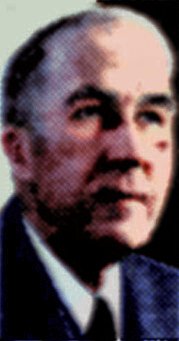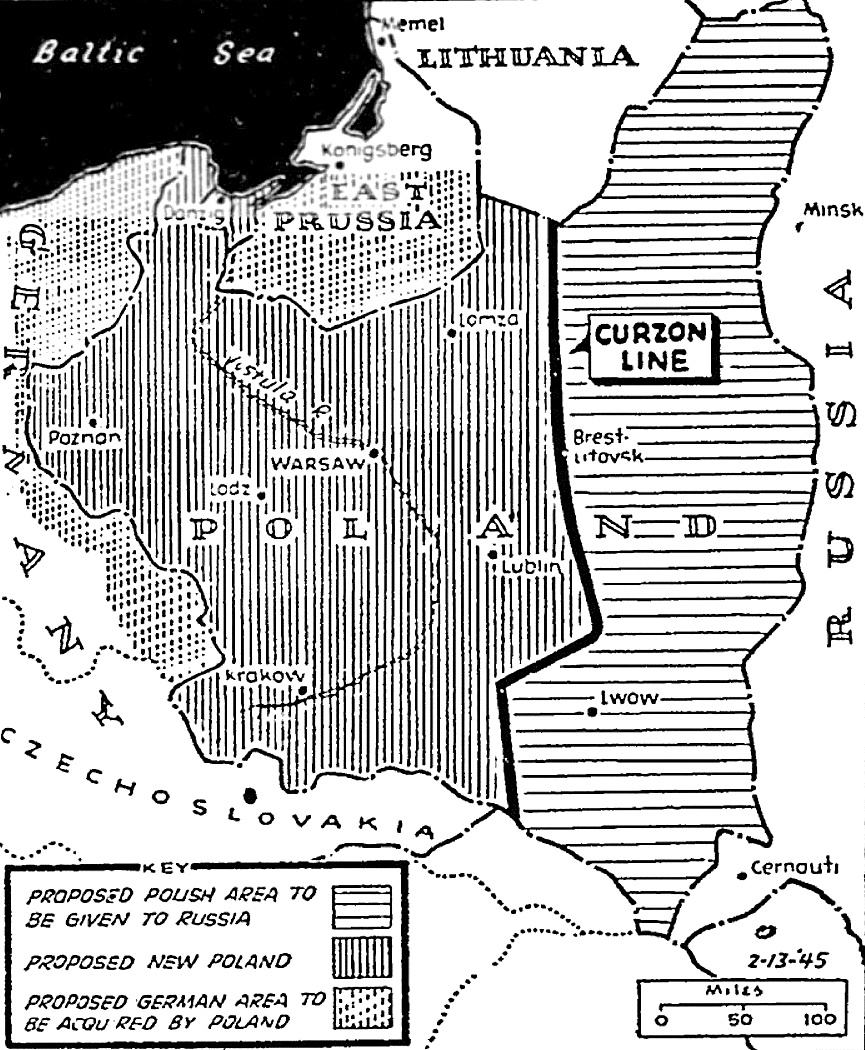Congress backs Big Three unity
United Nations to draft world security treaty in San Francisco April 25
By Lyle C. Wilson, United Press staff writer
WASHINGTON – The Roosevelt-Stalin-Churchill conference report got an enthusiastic cheer from Congress today on its proposal that the United States, Russia and Great Britain be bound in post-war unity as a “sacred obligation” to the peoples of the world.
President Roosevelt, Marshal Joseph V. Stalin and Prime Minister Winston Churchill made that post-war compact the foundation of their “report and statement” on the Crimean conversations.
To achieve it they announced they had summoned the United Nations to conference in San Francisco April 25 to draft a world security treaty. It will be in the Dumbarton Oaks pattern.
The Black Sea conferees announced they had reached final agreement on treaty framework, including voting methods.
Announcement yesterday of completion of the Roosevelt-Stalin-Churchill conversations and of the April conference call opens the administration campaign to present the security treaty to the Senate before hot weather begins to swelter this capital. Final Senate action is sought by midsummer.
The conferees held their eight-day meeting in Yalta, a Crimean resort.
German people assured
They said they had agreed on war and post-war plans for Germany. ‘They passed on her a grim cleansing sentence, but assured the German people that they would survive and be fit to live within the “comity of nations.”
They announced agreement on objectives and methods of dealing with most of Europe’s political and economic problems – boundaries, forms of government and such. They promised aid to distressed populations and revealed they would intervene jointly almost anywhere to aid or prod liberated peoples toward desired objectives.
The report revealed a specific Polish settlement based on compromise but in very substantial measure granting all basic Russian demands, including territory. There were instant rumblings of objections to that.
But overall political and economic plans for Europe were tied firmly to the ideal of free elections and universal suffrage.
April 25 fateful date
This latter plan was regarded as a reassurance to Americans, and especially to the Senate, where Mr. Roosevelt soon must stand sponsor of a security treaty guaranteeing world peace backed in part by our armed forces.
Some saw an inference in the statement that Russia is maneuvering to swing at least its moral strength into the Pacific war against Japan. It was no more than an inference.
But it was observed that April 25, when the United Nations conference begins at the Golden Gate, is the last date upon which Japan or Russia can denounce their mutual non-aggression pact.
At table with Chinese
Furthermore, unlimited Russian participation in a United Nations discussion will put them at the same table with the Chinese, whom Russians have avoided because their enemies have not been the same. China fights Japan. Russia fights Germany.
The Crimean report ended on a note of “unity for peace as for war.”
The three most powerful men in the world said:
Our meeting here in the Crimea has reaffirmed our common determination to maintain and strengthen in the peace to come that unity of purpose and of action which has made victory possible and certain. We believe that this is a sacred obligation…
France recognized
The conferees significantly beckoned France to first rank political status in post-war peace machinery and promised her participation in the occupation of the beaten enemy. China was also granted first-class power by promise of a permanent seat, along with France and the Big Three, on the World Security Treaty Council.
The bid for American and senatorial support was in the form of a vigorously enthusiastic conference endorsement of the Atlantic Charter.
Congress welcomed the report which was read in the Senate and circulated among members of the recessed House. The reaction was not unanimous, but it was far from partisan. Republican Senators rose with Democrats to say to the Big Three: “Well done.”
Lauded by Hoover
Former President Herbert C. Hoover called the Crimea agreement a “strong formation on which to rebuild the world.”
“It is fitting,” he told a New York audience, “that it should have been issued on the birthday of Abraham Lincoln.”
The Polish exile government in London evidently intends to repudiate the Big Three agreements as to its own fate, which is early extinction. There was some complaint here, too, against boundary and other plans for the Poles. But few of Mr. Roosevelt’s recent state papers have been better received at first glance on Capitol Hill.
‘Stimulating message’
“A very stimulating message,” said Sen. Alexander Wiley (R-Wisconsin), who has been listed by some persons as an isolationist. “It shows an apparent unity of purpose which the world has been looking forward to, and we hope it will ultimate in a real instrument for international collaboration.”
Referring to the report as “this momentous document,” Senate Democratic leader Alben W. Barkley, D-Kentucky, said:
If we can accomplish the objectives set forth in this Crimean conference, we will go a long way toward justifying the terrible sacrifices we are making in treasure and blood.
‘Great work done’
Senate Republican leader Wallace H. White Jr. (R-Maine) immediately rose from his seat across the aisle.
“A great work has been done,” he told the Senate.
Everyone wanted to know what Sen. Arthur H. Vandenberg (R-Michigan) thought of the Big Three job. Mr. Vandenberg proposed and Republicans generally have adopted a foreign policy based on immediate treaties for the permanent demilitarization of Germany and agreements for post-war examination of all political adjustments made or being made in Europe.
‘Best so far’
“The report is far the best that has issued from any major conference,” said Mr. Vandenberg, although reserving the right to seek more detailed information, especially about Polish political and boundary agreements.
He continued:
It reaffirmed basic principles of justice to which we are deeply attached. And it undertakes for the first time to implement these principles by direct action. The total demilitarization of Germany and the pledge to proceed among our Allied friends on the basis of the Atlantic Charter are greatly encouraging.
The Roosevelt-Churchill-Stalin report bore down hard on the Atlantic Charter, which Mr. Roosevelt has been accused of forgetting.
‘Joint’ action stressed
The three men repeatedly emphasized the “joint” nature of their plans and intentions in all respects. They reported, without disclosing the solution, that they had agreed upon a plan for voting in the council of the proposed security organization.
Voting procedure stymied the Dumbarton Oaks conference here: It adjourned without decision whether all council members should have a vote even though one of them be a party to the aggression they were seeking to suppress or to prevent.
Russia insisted that all should vote and that one negative ballot should have veto power.
Details withheld
The Crimean conference report said that the solution of this problem would be revealed after China and France have been advised of the agreed upon procedure. If China and France go along and the Crimean conferees explored all parts of the security problem in amity, it would seem that the United Nations conferees in San Francisco next April will not be long in session.
Mr. Roosevelt and his foreign policy advisers are convinced that agreement and ratification of a world security treaty must be obtained at once to avoid the delays and defeats encountered after World War I.
To that end they have laid out a program not unlike Woodrow Wilson’s famous 14 points. This time, however, there is a report from leaders of the three nations most immediately concerned, undertaking to follow stipulated procedure in making desired post-war conditions come true.
Procedure listed
The stipulated procedure is embodied in a “Declaration on Liberated Europe.” It is an agreement among the three men on several points:
-
The United States, Britain and Russia will act in concert to assist the liberated peoples to solve by democratic means their immediate political and economic problems. They expect that to be necessary during a “temporary period” only.
-
This requires destruction of the last vestige of Nazism and adherence to the Atlantic Charter principle that all peoples have the right to choose the form of government under which they shall live.
-
To foster conditions in which the liberated peoples may enjoy that right, the conferees agreed that when necessary, they jointly would assist the people of any liberated state or former Axis satellite to achieve four specific objectives:
(a) Establish conditions on internal peace.
(b) Effect emergency measures for relief of distressed peoples.
(c) Form interim governmental authorities broadly representative of all democratic elements of the population.
(d) Facilitate the holding of free elections.
Where the three powers intervened to form interim governmental authorities, it would be with the understanding, the report explained, that it would be only for the purpose of “the earliest possible establishment through free elections of governments responsive to the will of the people.”
The United States, Britain and Russia promised to consult other governments when matters of direct interest to them were involved in such cases. Prior to any action to make good on the foregoing pledges, the representatives of the three governments would consult among themselves.
The report said it was the hope of the three conferees that the provisional government of France “may be associated with them in the procedure suggested” – evidently as an equal partner.
The report said:
By this declaration, we reaffirm our faith in the principles of the Atlantic Charter, our pledge in the Declaration by the United Nations, and our determination to build in cooperation with other peace-loving nations world order under law, dedicated to the peace, security, freedom and general well-being of mankind.
To further the foregoing program and to maintain a political and diplomatic continuity of thought and action, the conference agreed that the foreign secretaries of the United States, Russia and Britain would meet hereafter about every four months. The first meeting is scheduled for London after the April United Nations conference here. Other meetings would rotate among the three capitals.

